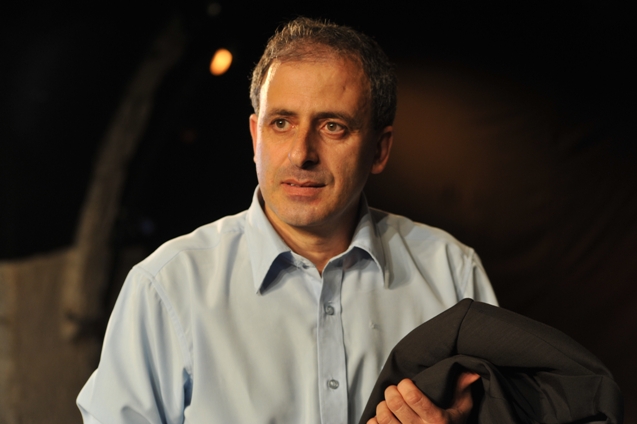
With a unique platform and venue– the Theatronetto 2010 Festival (monodramas in Hebrew), he is the ideal candidate: a handsome appearance, sincere gaze, easy charm and disarming humor. Waving, greeting the crowds, he ascends the stage and begins his campaign with an outrageous proposition: free parking. The promise is almost reassuring in its absurdity: there will never be free parking in Tel Aviv – there isn’t enough room. This is just a warm-up for the candidate’s next outrageous proposition: he is campaigning to be the first Arab Prime Minister in Israel.
We live together and apart.
We don’t even share a common native language; it’s no wonder that communication is difficult between Jews and Arabs in Israel. Most Arabs know Hebrew, but few Jews know Arabic. What Jews and Arabs in Israel do share are these strange circumstances in which we find ourselves living. In this surreal environment perhaps the only way to say what is on your mind is to step up on a stage – and that is what Afif Shlewet has done in his outstanding play: The Confessions of a Political Whore.
The split between the two cultures that exist in the same place yet rarely interact is reflected in the program notes stating that this play won first prize in the Masrahid Festival (monodramas in Arabic) in 2002. The current Hebrew language version adapted and directed by Arye Yass and performed by Shlewet, is funny, provocative, seductive and brilliant. It is not only politically daring, it is theatre at its best.
Shlewet walks the tightrope between the real and the imaginary with elegance and ease. He radiates the warmth of the consummate politician, chatting with his potential voters – the audience – as if they are old pals. The audience is at ease; after all, this is the theatre. He is not a candidate for Prime Minister, he’s an actor. It’s not real – and this is where the fun begins. Shlewet constantly plays with the structures and assumptions that form our notion of reality, reminding us, in a taunting, yet good-natured way, that he is manipulating our emotions.
He declares that he is against armed struggle and gets the audience to chant with him, then smiles and comments: “Did you see, I got you to say that. I’m a good actor.” He is a wonderful actor, and of course, in admitting his professional duplicity, he draws the audience closer. We know this game – self-conscious theatre, breaking down the fourth wall – and we are charmed into playing along as he tells his story. From high school crushes on his blonde counselor, through his university studies, marriage to a Jewish woman and involvement with politics, through the jokes, recounting the mild adventures and dilemmas of one man. He alternately draws the audience closer, creating an atmosphere of camaraderie, and then exploding the illusion, suddenly pointing to a bag on the floor, asking, “Whose bag is that?” – a question that is all too familiar in this part of the world, then turning the tables on the familiar situation asks: “Why do I always have to prove that I am OK, that I am good?”
Confessions of a Political Whore is enormously entertaining, but not always easy to take. There are moments that may make both Arab and Jewish audiences squirm in their seats (at different moments, of course). Engaging the audience, Shlewet has transformed his monologue into a sort of dialogue, which may be the most outrageous proposition of them all – let’s talk to one another.
AYELET DEKEL






Comments are closed.